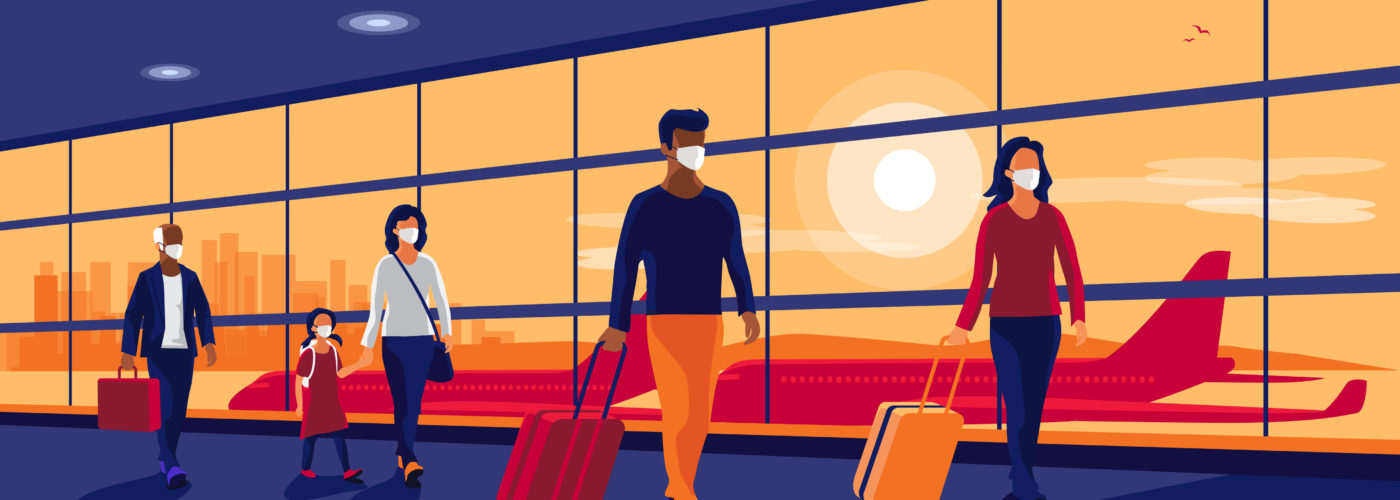As COVID-19’s highly contagious Delta variant spreads and other coronavirus mutations continue to threaten, you might be nervous about traveling. If you don’t want to cancel your trip, there are some simple steps you can take to increase your chances of staying healthy while traveling.
But don’t take it from us—take it from those who’ve committed their life’s work to keeping populations healthy. Here are 10 tips from public health experts about how to travel safely during a pandemic.
Get Vaccinated
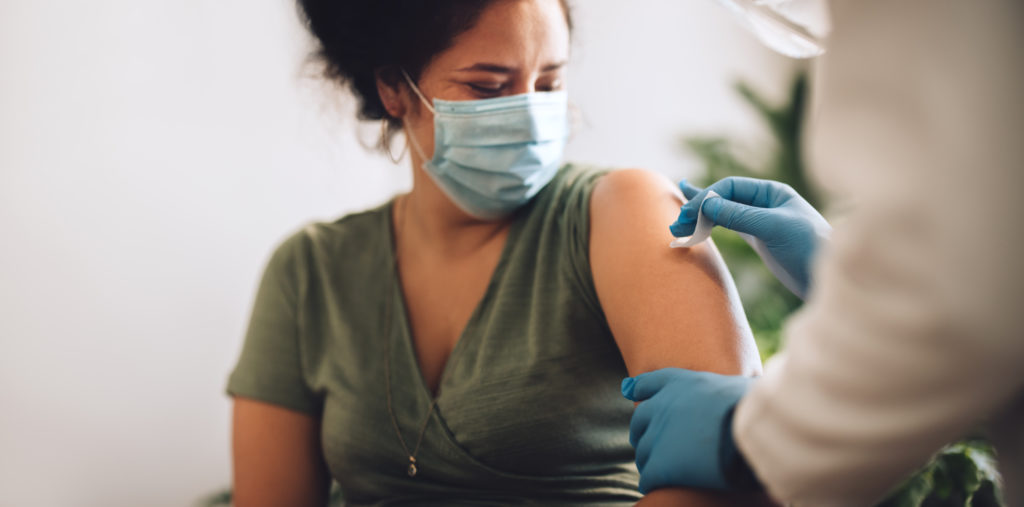
Unequivocally, public health experts’ top tip for anyone who’s even considering going anywhere at all in the near future can be encapsulated in two words: Get. Vaccinated.
“People should only be traveling if they’re fully vaccinated. Unvaccinated individuals should refrain from travel at this time,” says immunologist Dr. Robert Quigley, who specializes in infectious diseases in his role as the global medical director of International SOS.
“Be fully vaccinated for COVID-19 before travel,” agrees Erica Susky, a certified infection control practitioner at Toronto Western Hospital, “and stay with people who are also fully vaccinated, since they’re less likely to contract the virus. If a fully vaccinated person does get infected, they’re less likely to spread it and get severe disease that would require hospitalization.”
Jim Evans, an emergency medicine physician and a senior medical consultant for Allianz, sees this firsthand in the ER: “The people who are fully vaccinated are at greatly reduced risk of becoming ill. We’re not seeing severe illness in fully vaccinated patients, either in the emergency departments or from a travel perspective. Those who are requiring significant assistance while abroad, or who require evacuation while traveling, or who end up in the emergency department with severe illness are those who aren’t vaccinated.”
Allow at least 14 days after your second vaccination before you travel, since your body needs that time to build immunity after your vaccination, says Gail Trauco, a registered nurse and the CEO of the clinical research company PharmaKon.
Public health experts do acknowledge that not everyone can get vaccinated “for a wide variety of clinical reasons,” as Michael Huxley, an advanced nurse practitioner who runs the Bemused Backpacker Travel Clinic, puts it. This includes people who are allergic to components of the vaccine. But that makes it all the more important for those of us who can get vaccinated to protect those who can’t, including, at press time, millions of children.
Vaccines are good for the travel industry too: A recent study reveals that more than 40% of people would pay extra to be on a 100% vaccinated flight or stay at a 100% vaccinated hotel or resort.
Do Your Research
During a pandemic, advance planning is “the best thing you can do to keep yourself safe,” Quigley says. “Prior to travel, be aware of travel restrictions at your destination, including quarantine, vaccination and testing requirements upon arrival. You should also know the same requirements with regard to returning to your place of residence. Also know your destination’s rules and regulations regarding masks and social distancing, and the extent to which your destination has been affected by COVID-19.”
Trauco agrees with the guidance to check travel restrictions prior to departure. She adds: “Does your hotel have open restaurants or room service? Reduced travelers and staff shortages have forced restaurants to close, so inquire about restaurant hours and items available, since you may decide to stay at a residential hotel with kitchen accommodations, such as a Marriott Residence Inn.”
As Quigley says, it’s crucial to understand the prevalence of Covid-19 at your destination. Brady Simpson, who runs Peanut Travel, suggests using his company’s free tool to gather this information, plus all of the COVID entry requirements for where you’re going. “Traveling to a destination is half the battle,” Simpson says, “and it’s incredibly important to research the destination you’re traveling to, as every city has differences in the number of vaccinated adults, case transmission, availability of ICU beds and more, all of which can significantly impact traveler safety.”
Relatedly, many destinations and attractions now require proof of vaccination for entry, so travel with your original vaccine card, advises Trauco, and have a photo of it on your phone for good measure. Products such as the wallet-sized VaxCard provide a durable, waterproof card that you can use for proof of vaccination wherever you travel.
Mask Up
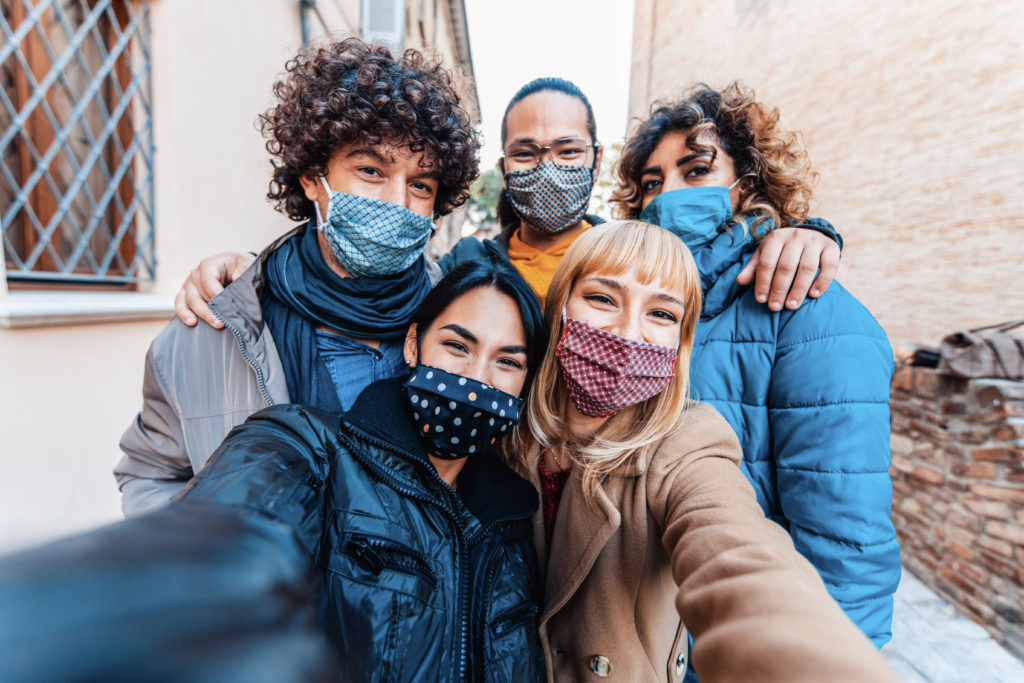
“Make sure that you stay properly masked when flying or using any other public transportation,” advises Evans. “Ensure that your mask fits well and covers your nose and your mouth.”
As Susky points out, “Masks are what healthcare workers wear universally to protect themselves while caring for patients, as anyone may be at the stage just before they develop symptoms, which is when the virus is most transmissible.”
And the type of mask you choose to wear matters. “Medical-grade masks are more effective than cloth at preventing COVID-19,” says Luis Arguello, a spokesperson for the PPE manufacturer DemeTech. “We’ve known this all along. And we continue to see more data backing that up,” pointing to a recent study wherein communities that used cloth masks reported an 8.5% reduction in symptoms, while communities that used surgical masks reported a 13.6% reduction.
Your best option? N95 masks. True to their name, they prevent at least 95% of airborne particles from getting in, according to the EPA. By contrast, a three-layer knitted cotton mask blocks less than 27% of particles.
Maintain Hygiene
Hygiene is always important, but it’s especially important during a pandemic. As Huxley says, “The gold standard of infection prevention control during any outbreak is basic hygiene.” By that, he means to wash your hands thoroughly and regularly. Use alcohol-based hand sanitizer when you can’t get to soap and water. Wipe down high-touch surfaces with disinfectant, and don’t touch your face.
“Whether you’re on a plane, in an airport or at a hotel or attraction, stick to the basics,” Evans reiterates: “Hand-washing and personal hygiene, and avoiding contact with frequently touched surfaces like elevator buttons and ATMs. If you must touch such surfaces, use hand sanitizer immediately after, then wash your hands as soon as you can.”
Keep Your Distance
If you’re considering adding crowded attractions, like theme parks or sports events, to your travel itinerary, consider Quigley’s input: “Avoid activities that involve being in close proximity to those you didn’t travel with. Participate in activities where you can appropriately social distance and spend time outside to avoid exposure.”
Should you find yourself among lots of people who aren’t in your travel bubble, Evans says, “Give a wide berth to anyone who appears sick or has a cough or other respiratory symptoms.”
Pack Appropriately
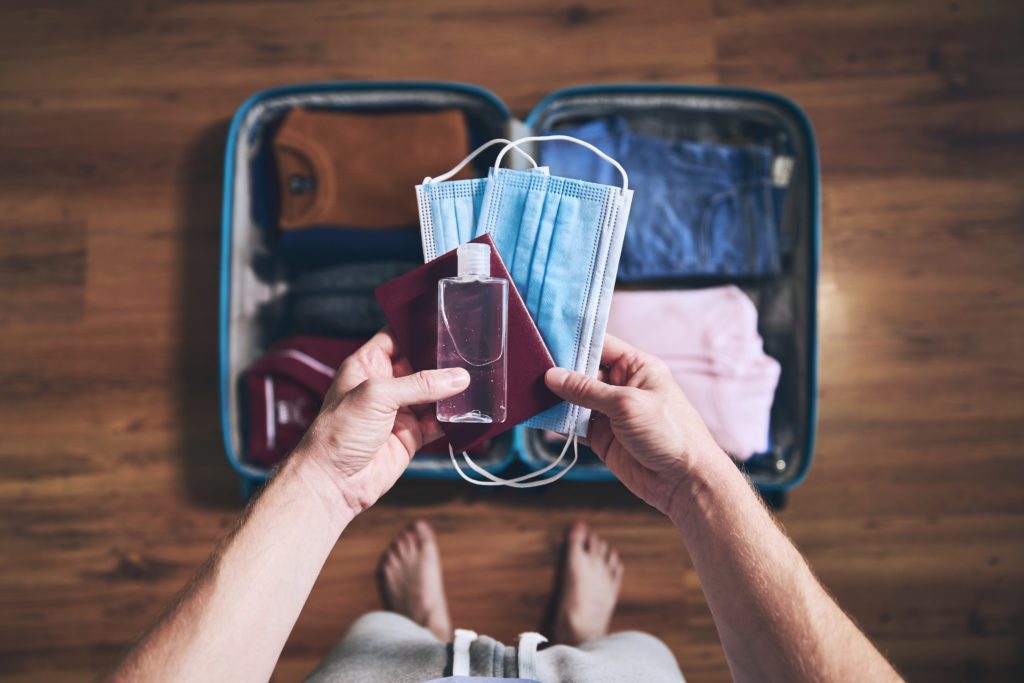
How you pack can also make a difference in protecting yourself from coronavirus. “Travel with antibacterial wipes and alcohol-based hand sanitizer that’s 70 to 90 percent ethanol,” says Susky. Bring an adequate supply of medical-grade face masks and, as Quigley recommends, extra amounts of prescription medications that you depend on, since virus surges can cause unexpected lockdowns or quarantines that could delay your return home.
To reduce how many people interact with your luggage, Evans says, “Put as many personal items in your carry-on as possible so that they’re not touching other surfaces and so that no one else handles them. Don’t pack drinks or other restricted materials in your carry-on so that it’s not flagged for further screening.”
Prepare to Cancel or Postpone
“It goes without saying that no one should travel when ill, even mildly so,” emphasizes Susky. “Doing so goes against all of the public health mandates to date. In addition, people with allergies or a ‘cold’ should consider that they may actually be carrying SARS-CoV-2.”
This means that if you develop symptoms—any symptoms—just before a long-awaited trip, you should cancel or postpone that trip. A disappointing hassle, yes, but living through a disruptive global event means needing to be flexible for the sake of everyone’s health, including your own.
To financially protect yourself from needing to cancel a trip for health reasons, consider buying appropriate travel insurance to cover your plans.
Protect Yourself on Planes
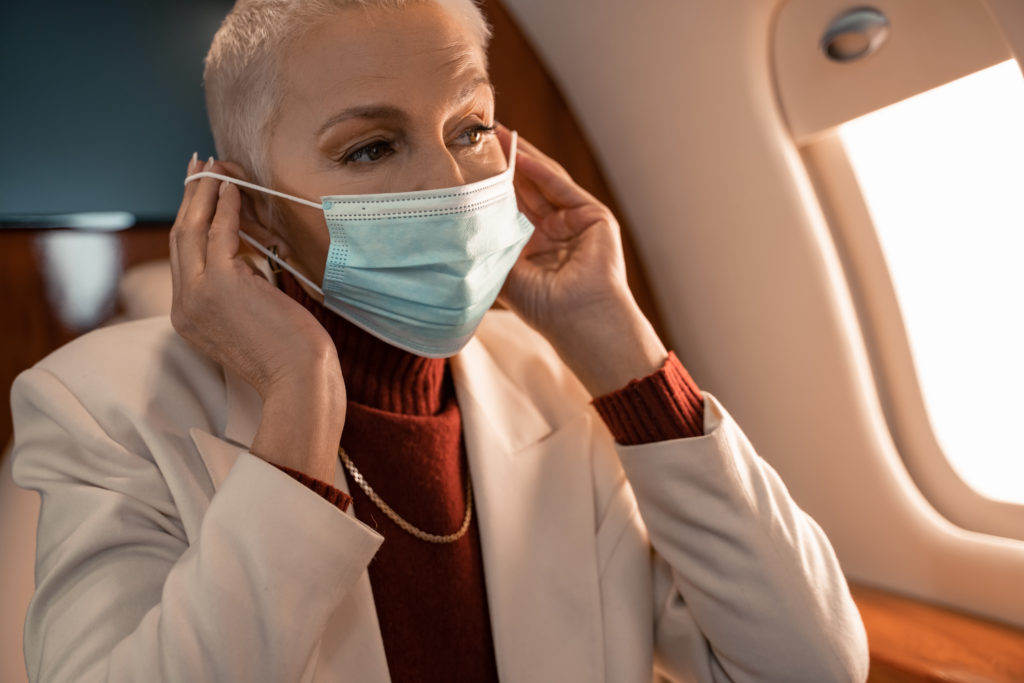
If you must get on an airplane during a pandemic, experts emphasize how important it is to wear a mask during as much of the flight as possible, especially if people near you are removing theirs to eat or drink. Plan to have a large meal and beverage before you get to the airport so that you can stay masked on the plane.
“In an airplane, you won’t know who has COVID, since the virus is transmissible up to 48 hours before symptoms occur,” Susky reminds us. “People can’t socially distance in adjacent seats. If someone isn’t wearing their mask, or is wearing it improperly, you can always respectfully request social distance.”
In addition to keeping your mask on, experts also recommend keeping your air vent on. Aim it to blow directly onto you, to create an air barrier that can block airborne germs—but bring a jacket if you tend to be cold on flights.
Sue Barnes, who served as Kaiser Permanente’s national infection prevention director for 27 years, always brings a pack of disposable germicidal wipes on the plane. “As soon as I’m seated,” she says, “I wipe all the surfaces that I’ll touch during the flight, including armrests, my seatbelt, tray table, TV screen, magazine pocket and air vent control.”
At the airport, take advantage of any space around you to spread out and practice social distancing, advises Tim Mynes, a medical director for MedExpress Urgent Care. “As you’re seated at the gate waiting for your flight,” he says, “consider sitting farther away from the front or at the next unoccupied gate to put some space between you and others.”
“If the distance you’re traveling isn’t too great,” Evans suggests, “you may want to opt for driving instead of flying to your destination, especially if you have a compromised immune system.” Susky agrees: “If it’s possible to travel with fewer people by taking a car or a train, that’s safer than airplanes, which have a higher seating capacity in a smaller area.”
If you do choose to drive, though, “Minimize any stops that you make,” Evans says, “and wipe down surfaces that you need to touch in public places.”
Take Precautions in Hotels
Public health experts seem to agree that staying at a hotel is relatively low risk in terms of coronavirus transmission, especially if you take a few key preventative steps. Susky reminds hotel guests to wash their hands regularly, especially after using the restroom and before eating.
Evans recommends bringing disinfectant wipes: “Immediately upon check-in, wipe down all frequently touched surfaces in the room, including all handles, any tables, and remote controls.” Evans also advises minimizing room service requests and wearing masks in common areas.
Mynes, for his part, recommends avoiding common areas in hotels, dining outdoors and using amenities such as swimming pools and beaches only when they’re not crowded.
Be Smart With Friends and Family
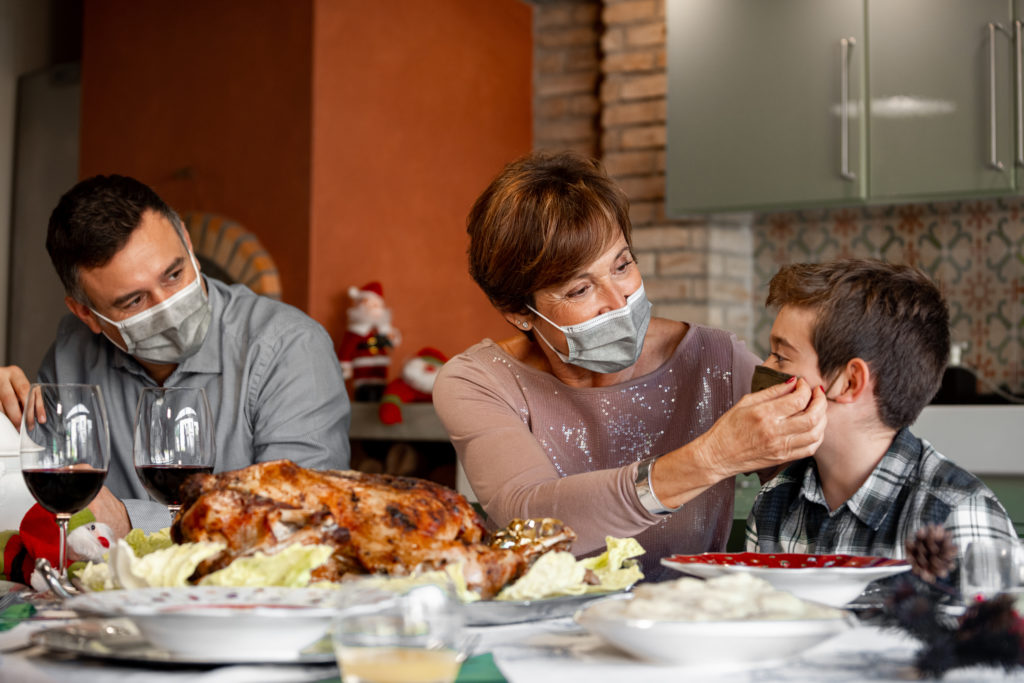
If you’re traveling to see family or friends, the experts have advice for that too. “At relatives’ houses, it’s better to maintain social distance, especially within the first few days of a visit,” says Susky. “Ideally, eat meals separately or outside, since transmission is riskiest when people sit close together and remove their masks.”
When you’re at someone’s house, advises Evans, “Consider risk tolerance. For example, parents of children who can’t yet get vaccinated may want to take precautions when gathering with grandparents or anyone with a compromised immune system.”
Mynes agrees that travelers shouldn’t let down their guard when staying with relatives. “Although it may feel awkward being cautious with family members,” he says, “it’s better to be safe than sorry and to practice social distancing and masking, especially with relatives who are immunocompromised or unvaccinated.”
You Might Also Like:
• Japan Is Finally Reopening for Tourism• Do You Need to Be Vaccinated to Fly?
• US to End Air Travel COVID-19 Testing Requirement
• How Risky Is Traveling Without a Mask Mandate?
• When Can I Travel After Testing Positive for COVID-19?
We hand-pick everything we recommend and select items through testing and reviews. Some products are sent to us free of charge with no incentive to offer a favorable review. We offer our unbiased opinions and do not accept compensation to review products. All items are in stock and prices are accurate at the time of publication. If you buy something through our links, we may earn a commission.
Related
Top Fares From
Today's Top Travel Deals
Brought to you by ShermansTravel
Shop and Save with Country Inns...
Patricia Magaña
 Hotel & Lodging Deals
Hotel & Lodging Deals
$229 -- Chicago: Discounted Rates and...
Francesca Miele
 Hotel & Lodging Deals
$229+
Hotel & Lodging Deals
$229+
$188 -- Honolulu: Save on Oceanview...
Abigail Lamay
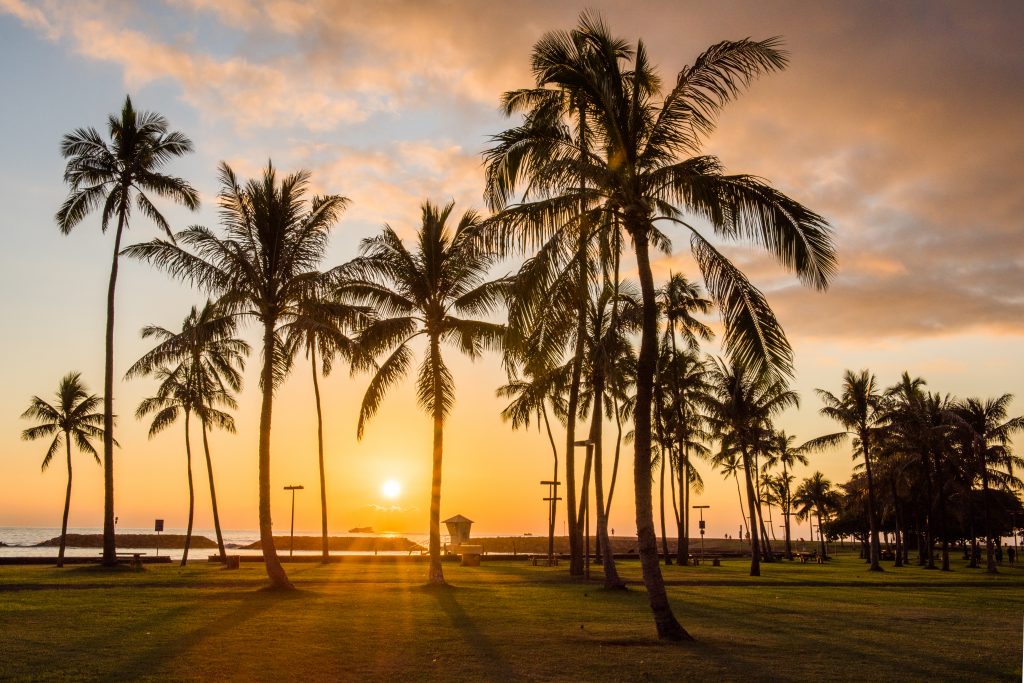 Hotel & Lodging Deals
$188+
Hotel & Lodging Deals
$188+
